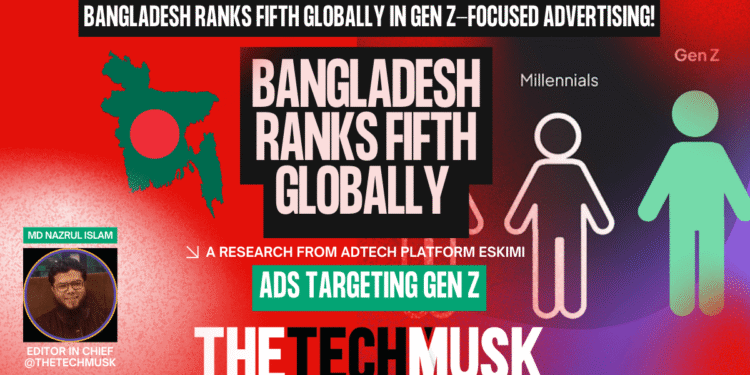Bangladesh has emerged as one of the top countries globally in targeting Generation Z through online advertising campaigns, ranking fifth in a new study conducted by global media tech (AdTech) platform Eskimi. Well, Eskimi is a global, full-stack, end-to-end creative and media tech platform. It delivers data-driven creatives that capture attention, quality supply, advanced audience targeting, reaching 2.5 billion users, and local relevance that captures attention and creates brand impact. Eskimi operates worldwide with people on the ground in over 40 markets.

The report analyzed more than 81,000 online display campaigns across 184 countries. Greece, South Africa and Serbia topped the list, with Bangladesh emerging ahead of many larger markets
Gen Z: A Powerful Consumer Base
Generation Z is already reshaping global markets with unprecedented spending power. According to research by NielsenIQ and World Data Lab, Gen Z accounts for more than 17 percent of global spending and is wealthier at this stage of life than any previous generation. Unlike earlier generations, less than half of Gen Z’s spending comes from Western markets, underscoring the growing influence of emerging economies.
Joshua Prottoy Adhikari, Regional Director for Eskimi in South Asia, highlighted this shift:
“Gen Z is the first generation to grow up entirely online, fluent in social media, e-commerce, and digital platforms from an early age. Brands that delay learning about this audience may struggle to maintain relevance and, ultimately, revenue growth.”
Bangladesh Ahead of the Curve
Eskimi’s study, which analyzed over 81,000 display ad campaigns across 184 countries, placed Bangladesh ahead of many peers in its Gen Z engagement strategies. Globally, Greece, South Africa, and Serbia claimed the top three spots, while Bangladesh secured a strong fifth place.
In Bangladesh, fast-moving consumer goods (FMCG) companies are the most active in reaching Gen Z, representing nearly half (49%) of targeted campaigns. Transport and logistics firms follow with 14%, while entertainment brands account for 11%. By contrast, technology and education sectors remain less prominent in the country’s Gen Z outreach, despite their potential for influence.
Adhikari noted the surprising dominance of traditional sectors:
“Many industries still underestimate Gen Z’s influence, risking falling behind as this generation forms loyalties. Despite growing up on social media, Gen Z’s media habits are deeply cross-platform, and display advertising remains a powerful way to reach them at scale.”
A Challenging Audience for Advertisers
Despite their spending power, Gen Z is proving a demanding target. Campaigns aimed at this group often record lower click-through rates compared to those targeting Millennials, indicating higher selectivity among younger consumers.
To help brands connect with Gen Z, Eskimi recommends:
- Innovative ad formats such as interactive and rich media creatives.
- Diverse channel strategies rather than relying on a single platform.
- Creative storytelling that emphasizes authenticity and cultural relevance.
- Agility in execution, with rapid testing and adaptation to shifting trends
The Bigger Picture
Eskimi’s findings underline the urgency for brands worldwide, particularly in emerging markets like Bangladesh, to rethink their advertising strategies. With Gen Z shaping the future of global consumption, early movers stand to gain a decisive advantage.




























